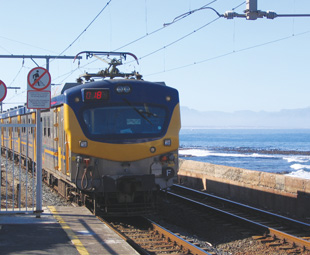Judicial underreach?

VAUGHAN MOSTERT presents a transport case study for the judiciary’s role in transport spending
Did you hear the one about the three judges who walked into a bar? Neither did I. Nowadays, few people joke about the judiciary, which has earned the deep respect of the community for a string of awesome judgments on constitutional issues. Long may it continue.
On the other hand, some people seem to be having a problem with “judicial overreach”. So where should the judiciary draw the line? As usual, the transport field is a grey area. Bearing in mind that South Africa spends R1 trillion a year moving people and things around (much of which is wasteful) it is an area that might benefit from deeper judicial scrutiny.
Let’s illustrate this with a case study from Cape Town written almost 14 years ago. On October 13, 2003, Jonny Steinberg, then a freelance writer and now a professor at the University of the Witwatersrand, wrote a column in Business Day headed “Long-suffering commuters will not thank judges of appeal”. I am indebted to him for most of what follows here.
“Two years ago,” he wrote, “a group representing concerned rail commuters in Cape Town took Metrorail to court to demand that it do something about escalating levels of violent crime on trains.
“Western Cape High Court Judges Denis Davis and Belinda van Heerden duly handed down a stinging ruling against Metrorail, declaring it was failing to ‘protect the (constitutional) rights of rail commuters to freedom from […] violence, to human dignity, freedom of movement and to property’. They ordered Metrorail to come up with a plan to improve security, failing which it risked being held in contempt of court.”
Jonny continues: “Metrorail appealed and went to Bloemfontein. In a judgment handed down last month (September 2003), five Supreme Court of Appeal (SCA) judges laid into their High Court colleagues, arguing that their judgment had no basis in law.
“The carrier’s statutory obligation to run a commuter service ‘in the public interest’, three of the five appeal judges averred, meant no more than that Metrorail must administer the service ‘with due regard to the total transport needs of the public’. There was no provision, they continued, ‘for safety and security services to be provided by (Metrorail) to commuters’. Protecting commuters from crime was the duty of the police.
“Could Cape Town’s commuters get a court order instructing the police to improve security on the trains? No, the SCA said. The judges accepted a South African Police Service submission that ‘the allocation of more police to trains and railway stations will result in a loss of manpower elsewhere […] considerable cost would have to be incurred with budgetary implications for the government’s priorities and spending plans’.
“Courts, the (appeal) judges argued, had no business rewriting state budgets. They could only rule whether government distributed scarce resources in a reasonable way. It could not be argued, they continued, that police priorities were unreasonable.”
Still with Jonny: “You can imagine how the judgment has gone down in Mitchells Plain and Athlone. All that counts in the ghettos is that people avoid trains like the plague on Fridays as predators prowl in search of weekly pay packets, lone women are afraid of using public transport to get to work, and ordinary people have lost control of a vital public space.
“From the vantage point of the Cape Flats, the story is that nobody is duty bound to get people to work safely; Metrorail and the police are shrugging their shoulders, and the appeal court is encouraging them to keep shrugging.
“Not a good thing on the eve of a closely contested election; not a good message to be sending to thousands of commuters about to put a ballot in a box. Here’s an election tip for the ruling party. Throw the SCA’s judgment in the dustbin and flood the stations with cops. Put them on the trains. Rudolph Guiliani’s famously successful zero-tolerance campaign in New York began on the subways. Why? Because more than half the city had to use them to get to work.”
Thanks Jonny. (As it happened, the ANC lost the subsequent election in the Western Cape.)
Where does this leave us in 2017?
It goes beyond rail transport. When is government going to start fixing the feudal minibus-taxi industry? Taxi users also have constitutional rights – will a non-governmental organisation institute a class action on their behalf?
Will the EFF’s court case against Transnet succeed? Will the Organisation Undoing Tax Abuse (Outa) win the battle with the South African National Roads Agency (Sanral)? Is government distributing scarce resources in a reasonable way?
Maybe the courts should be rewriting the state’s budgets! Weak planning and failure to integrate existing services at provincial and municipal level is adding billions to transport costs in the form of unnecessary private motoring. As for the Gautrain, a judicial inquiry is long overdue.
We have a lot to think about. Maybe the judiciary will still come to our rescue.
Vaughan Mostert lectured on public transport issues at the University of Johannesburg for nearly thirty years. Through Hopping Off, Mostert leaves readers with some parting food for thought as he continues his push for change in the local public transport industry.
Published by
Focus on Transport
focusmagsa




